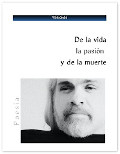
Preámbulo 1
El texto literario es la forma más sublime de cada lenguaje, en él se exalta la belleza de la palabra, de la imagen literaria, del ritmo de las palabras. Es por eso que el autor tarda muchas veces en encontrar la palabra exacta a emplear en su oración, pues no se trata simplemente de “decir” algo, sino es “cómo” decirlo. Se trata de mostrar la máxima belleza del lenguaje para narrar cualquier historia, pues hasta el drama más terrible, utilizará el lenguaje más hermoso.
English version below
Preámbulo 2
Bien lo han dicho muchos estudiosos, que los idiomas responden a estructuras mentales relacionadas con la percepción del entorno y que muchas veces tienen un significado subjetivo. Pero no vamos a sumergirnos en aguas profundas, lo que quiero decir, es que cada idioma tiene su “forma” de decir las cosas y que en la mayoría de los casos hay que conocer bien el idioma para entender lo que expresan determinadas palabras. Es decir la traducción literal no funciona en la mayoría de los casos. Un ejemplo de ello es la pregunta en español “¿Cuántos años tienes?”, que traducida de manera directa, no tendrá sentido en inglés, mientras que la pregunta “How old are you?” (¿Cuán viejo eres tú?) sonará absurda para el hispanoparlante.
El asunto
Partiendo de los dos preámbulos, podrás entender que un traductor electrónico no es capaz de traducir un texto literario. A duras penas han logrado algunos programas, como el de Deepl.com, empezar a traducir textos con considerable coherencia, lo cual ya significa un avance grande. Pero la verdad es que aún no logran traducir como una persona, pues no “entienden” las “intenciones” de cada frase. Los programas no entienden “la idea” de muchas de las expresiones y por eso, las traducciones de programas como Deepl o Google Translate son altamente deficientes.
Ante esa realidad, plantearse traducir por estos medios un texto literario ofrece pésimos resultados. Esta es, lamentablemente, una práctica común en Hive, especialmente de parte de la comunidad de habla hispana. Se entiende perfectamente que el objetivo es llegar a un público más amplio, pero la realidad es que llegar a un público más extenso, pero con una muy mala literatura tampoco va a traer buenos resultados.
No todo está perdido
La comunidad The Ink Well preocupada por esta situación y con deseos de apoyar a la comunidad de habla hispana y buscar mecanismos que le permitan mejorar sus versiones en inglés, ideó un sistema que es el que queremos presentarles hoy acá.
La propuesta vino de parte del administrador de esa comunidad, @shanibeer, y se la presentó a la comunidad de #Literatos, con la intención de que nosotros le demos el impulso necesario para llegar a la mayor cantidad de autores que publican contenido literario en español.
Se trata de conformar un equipo de “editores”, personas con un buen dominio de ambos idiomas, en este caso español e inglés, que sirvan de correctores y que puedan mejorar las traducciones hechas por Google Translate, Deepl o cualquier otro sistema automatizado.
La idea es que el autor se apoye en estos editores, para hacer un contenido que tenga la coherencia necesaria para participar en los concursos que se presenten en inglés, como el que está a punto de lanzar @TheInkWell y que explicamos más adelante.
La propuesta contempla que el autor coloque al Editor como beneficiario del 10% de la publicación, para compensar su labor en la revisión de los textos.
Para este fin necesitamos conformar el equipo de editores y que los autores expresen su interés en utilizar esta modalidad, la cual redundará en un texto en inglés sin los errores característicos de estos programas.
A las personas interesadas, ya sea en este servicio o para ofrecerse como editores, pueden dejar su comentario en esta publicación. Luego, en la medida que se vaya ampliando esta actividad, podremos desarrollar otras vías para establecer el contacto.
Vale aclarar que esta es una propuesta de crecimiento en equipo, que no aplica solo para autores en español, sino que plantea hacer colaboraciones, que se utilice como un equipo autor-editor para el crecimiento de ambos participantes y de toda la comunidad.
En este enlace puedes ver la propuesta original.
El premio de escritura de The Ink Well
Aprovechando las fiestas decembrinas, el equipo de The Ink Well se va a tomar unas vacaciones. Pero para que los ánimos no decaigan van a mantener abierto un concurso que abre el día 20 de diciembre y recibirá participaciones hasta el 10 de enero de 2021.
Tendrán 500 Hives en premios para repartir.
La invitación es participar con tu historia corta, en inglés, y para ello vas a tener tres semanas para poder prepararla y pulirla, de manera que quede lo mejor posible. Durante este período no van a estar curando otro tipo de contenido.
La comunidad The Ink Well tiene el apoyo de curación directa de @Curie y de @OCD.

Fuente | Source
English
Preamble 1
The literary text is the most sublime form of each language, in which the beauty of the word, of the literary image, of the rhythm of the words is exalted. That is why it often takes the author a long time to find the exact word to use in his or her sentence, since it is not simply a matter of "saying" something, but "how" to say it. It is about showing the maximum beauty of language to tell any story, because even the most terrible drama will use the most beautiful language.
Preamble 2
It has been well said by many experts that languages respond to mental structures related to the perception of the environment and that they often have a subjective meaning. But we are not going to dive into deep waters, what I mean is that every language has its "way" of saying things and that in most cases you have to know the language well to understand what certain words express. In other words, literal translation does not work in most cases. An example of this is the question in Spanish "Cuántos años tienes" (How many years do you have), which translated directly, will not make sense in English, while the question "How old are you? translated textually will sound absurd to the Spanish speaker.
The Subject
From the two preambles, you can understand that an electronic translator is not capable of translating a literary text. Some programs, such as Deepl.com, have barely managed to start translating texts with considerable consistency, which is already a big step forward. But the truth is that they still cannot translate like a person, since they do not "understand" the "intentions" of each sentence. The programs do not understand "the idea" of many of the expressions, and that is why the translations of programs such as Deepl or Google Translate are highly deficient.
Given this reality, thinking about translating a literary text by these means offers very bad results. This is, unfortunately, a common practice in Hive, especially on the part of the Spanish-speaking community. It is perfectly understandable that the objective is to reach a wider audience, but the reality is that reaching a bigger audience with a very bad literature is not going to bring good results either.
Not all is lost
The Ink Well community is concerned about this situation and wants to support the Spanish-speaking community and look for mechanisms to improve their English versions.
The proposal came from the administrator of that community, @shanibeer, and was presented to the community of #Literatos, with the intention that we give the necessary impulse to reach the greatest number of authors who publish literary content in Spanish.
The idea is to form a team of "editors", people with a good knowledge of both languages, in this case Spanish and English, who can serve as proofreaders and who can improve the translations made by Google Translate, Deepl or any other automated system.
The idea is that the author relies on these editors, to make a content that has the necessary coherence to participate in the contests that are launched in English, like the one that is about to launch @TheInkWell and that we explain later.
The proposal contemplates that the author places the Editor as the beneficiary of 10% of the post, to compensate for his work in the revision of the texts.
For this purpose we need to form the team of editors and that the authors express their interest in using this modality, which will result in a text in English without the characteristic errors of these programs.
Those interested, either in this service or to offer themselves as editors, can leave their comments in this post. Later, as this activity expands, we will be able to develop other ways to establish contact.
It is worth clarifying that this is a proposal for team growth, which does not apply only to authors in Spanish, but proposes to make collaborations, to be used as an author-editor team for the growth of both participants and the entire community.
In this link you can see the original proposal.
The Ink Well Writing Prize
Taking advantage of the Christmas holydays, The Ink Well team is taking a vacation. But in order to keep up the community spirit, they are going to keep a contest open, which starts on December 20th and will receive entries until January 10th, 2021.
There will be 500 Hives in prizes to be distributed.
The invitation is to participate with your short story, in English, and for that you will have three weeks to prepare and refine it, so that it will be as good as possible. During this period they will not be curating other content.
The Ink Well community has the direct curation support of @Curie and @OCD.


Descarga el poemario de @Ylich"De la vida, la pasión y de la muerte"¡Haz clic aquí! |  |
|---|

If you don't have an account at Hive yet, I invite you to read my post My Hive Testimony || Mi testimonio Hive
Si aún no tienes cuenta en Hive te invito a leer mi publicación My Hive Testimony || Mi testimonio Hive



Interesante propuesta. He visto como los traductores se equivocan mucho de género cambiando el sentido de la historia. Tambien sería bueno abrir espacios de discución para mejorar el aprendizaje de la lengua. Saludos
Sí, hay algunos casos en que más que errores, son horrores, los que salen de los traductores...
¡Buena propuesta la que haces respecto a los idiomas! Creo que Discord sería el escenario ideal para un proyecto así.
A great idea! That's one thing I love about our chain: how so many people are willing to give their work and time to the community, to help each other and thus make the sum bigger than its parts :)
Yes, and this is a good opportunity to grow up together, to learn from others while helping them!
Esta publicación ha recibido el voto de Literatos, la comunidad de literatura en español en Hive y ha sido compartido en el blog de nuestra cuenta.
¿Quieres contribuir a engrandecer este proyecto? ¡Haz clic aquí y entérate cómo!
¡Muchas gracias, amigos!
Muy buena iniciativa la de los amigos de #TheInkWell. En verdad, la traducción de textos literarios por uno de esos mecanismos electrónicos no es la mejor opción; pero a veces no queda otra. Personalmente, cuando hago textos en español e inglés, trato de revisar con atención la traducción, y, de acuerdo con mis posibilidades, mejorarla.
Me tomaré el abuso de proponer por aquí a tres usuarios que son escritores de literatura y docentes en inglés, y realizan labores como traductores: @marlyncabrera, @hlezama y @bertrayo.
Saludos, @ylich.
¡Excelente, ojalá ellos se integren a esta propuesta!
Hello @ylich and thank you for your support.
Bilingual Spanish/English speakers would be a great help, especially for Spanish writers who have no English. I think, as well, that writers that do have some English - and can converse in English - could work with English-language editors who have no Spanish. Hopefully, this way we could expand the network. Of course, writers and editors can reciprocate and help each other.
Best wishes, everyone.
You are very welcome!
This is a good idea and an option for editors that only speak English and want to be part of this solution!
This sounds like a great project, @ylich and @shanibeer
I love to see the Spanish and English speaking communities working together.
You can count on me as editor 👩💻